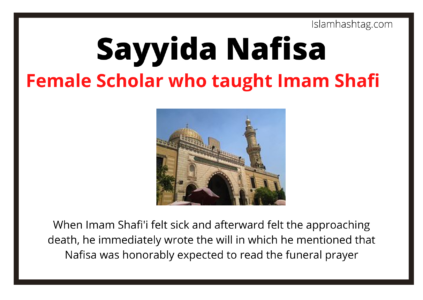The Female teacher of Imam Shafi-Sayyida Nafisa
A very People know that female Scholar and the teacher of Imam Shafi was Sayyedina Nafisa,. Her full name was As-Sayyidah Nafīsah bint Amīr al-Muʾminīn Al-Ḥasan al-Anwar ibn Zayd al-Ablaj ibn Al-Hasan ibn ʿAlī ibn Abī Ṭālib al-ʿAlawiyyah al-Ḥasaniyyah.
She was a famous Female scholar in Egypt who was born in 145 Ah and she died on 208 AH. She was ahle bayt: a descendent of Rasul Allah Sallahu Alaihe wa sallam. She was born in Mecca in about 762 CE, to Al-Hasan al-Anwar the son of Zayd al-Ablaj, son of Al-Hasan the grandson of Muhammad Sallalahu alaihe wa Sallam. She spent her later life in Cairo, where there is a mosque bearing her name.
Her Mosque is listed as part of the UNESCO World Heritage Site of Historic Cairo

She was a devout, ascetic, and of abundant virtue. Her students came from faraway places, and among them was Al-Shafi’i, the man behind the Shafi’i school of Sunni fiqh. She financially sponsored his education for him. Ibn Kathir in al-Bidayah wa al-nihayah reports about her the following statement:
She was a wealthy lady, did a lot of favors to the people, especially those paralyzed, those with severe illness, and to all other ill people. She was devout, ascetic, and of abundant virtue. When Imam al-Shafi’i arrived in Egypt, she did good to him, and sometimes Shafi’i led her in prayers in Ramadan.
— Ibn Kathir
Imam al-Shafi’i was reportedly a student of another great Imam of Sunni Fiqh, Malik ibn Anas. It is said that Imam Shafi’i, after coming to Cairo, called upon Nafisa to hear hadiths from her and that it was not possible that he was without the influence of knowledge and personality of Nafisa, since he had been a frequent guest in her house, a listener of her lectures in her mosque, and as it is reported by the historians, asked for her invocation (Duʿāʾ) and sought for blessings (Barakāt) from her. Sometimes Imam Shafi also led her in prayers in Ramadan.
When Imam Shafi’i felt sick and afterward felt the approaching death, he immediately wrote the will in which he mentioned that Nafisa was honorably expected to read the funeral prayer (Ṣalāt al-Janāzah). After the death of the Imam, his body was carried to her house and she prayed over it alone later the body was carried away and salatul Janaza was read by men . It reportedly could not be “without her popularity, fame, honor, and respect among the people.
Her piety was renowned to the extent that people came from far and near to seek her blessings; hagiographers recount her decision to leave Egypt due to the throngs that came to seek the blessings of Ahl al-Bayt leaving little time for prayer.
However, the pleas of the governor of Egypt, As-Sirri ibn al-Hakam, and the people for her not to leave Egypt convinced her to stay. Numerous accounts are given of the miracles she performed for those who sought her aid directly or through prayer, such as curing a blind child, intervening when the Nile did not rise one year as expected, preventing a ship from sinking, helping a poor woman who spent her life spinning wool to support her family, freeing a prisoner through her intercession, and seeing people through their difficulties.
Share this article- The Female teacher of Imam Shafi-Sayyida Nafisa
More than 150 miracles are attributed to Nafisa throughout her life and after death. After settling down in Cairo, there was a miracle of her curing the paralyzed daughter of a neighboring non-Muslim family. One day, the daughter was left in Nafisa’s house when her mother went shopping in the marketplace. When Nafisa did her ablution before prayer, some drops of water touched the girl and she started to move. When Nafisa was praying, the daughter stood up and ran to the coming mother, who was shaken and overjoyed at the same moment. After that miracle, the whole family and other neighbors accepted Islam
Subhan Allah. Did you know about her earlier?
Reference:
Muhaddithat; the female scholars of Islam
Follow us in Facebook
Discover more from Islam Hashtag
Subscribe to get the latest posts sent to your email.





